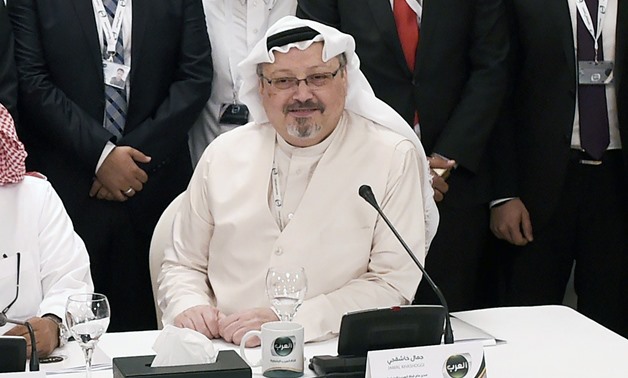The two leading Arab media, Al Jazeera and Al Arabiya have renewed their age-long media rivalry following the controversy surrounding the gruesome murder of Saudi-born journalist, Mr Jamal Muhammad Khashoggi, who until his mysterious death was a columnist with Washington Post in the US.
On Tuesday, October 2, the news of Mr Khashoggi’s disappearance was broken by Al Jazeera, a Doha, Qatar based media outlet with over 11 million followers on Facebook, Turkish media, and western media such as CNN and Washington Post.
According to Al Jazeera, Jamal Khashoggi, a Saudi dissident critical of the country’s Crown Prince Muhammad Ibn Salman, entered the consulate’s premises around 1pm (10:00 GMT) on Tuesday to sort out paperwork on his divorce with his former wife, the mother of his 4 children; and procure documents he needed to wed his Turkish fiancée, Hatice Cengiz.
Unfortunately, the 59 year old journalist never came out. His fiancée, who waited for him outside, was told by consulate staff that the journalist left the building through the back door. She immediately notified the Turkish police and the search began.
The following day, on Wednesday (October 3), Al Jazeera quoted Turkey’s President Tayyip Erdogan saying that Khashoggi remains inside the Saudi consulate, a day after his fiancée reported he had failed to emerge from there.
On Thursday, October 4, Turkey’s foreign ministry summoned the Saudi ambassador for consultations over Jamal Khashoggi’s disappearance.
Both Al Jazeera and Al Arabiya, the Saudi-owned media with 800, 000 followers on Facebook, quoted the Saudi consulate statement, saying it is “carrying out the follow-up procedures and coordination with Turkish local authorities to uncover the circumstances of the disappearance of Jamal Khashoggi after he left the consulate building”.
The two media however used different headlines. While Al Jazeera wrote: “Turkey summons Saudi envoy over Jamal Khashoggi’s disappearance”, Al Arabiya wrote: “Saudi consulate in Istanbul probing the disappearance of Jamal Khashoggi”.
——————————————
But the question is: Since the Saudi officials in Turkey knew that Khashoggi did not leave the consulate, why did they lie? Why promise to collaborate with Turkey to unravel the journalist’s mysterious disappearance?
——————————————
The news of Mr Khashoggi’s disappearance was initially greeted with silence from the Kingdom and the media it controls, especially Al Arabiya and Saudi Gazette, another leading English daily newspaper published in Jeddah, Saudi Arabia.
Three days later, on Sunday, October 7, Saudi Consul General, Mohammad Al-Otaibi appeared in a video where he reiterated that the 59year old journalist was neither at the consulate nor in the Kingdom of Saudi Arabia.
He revealed in the video, which was published by Al Arabiya with the headline: “VIDEO: Saudi Arabia opens up consulate, denies Khashoggi was on premises” that the consulate and the embassy were working to search for him.
On the same day (Sunday) but in another Al Arabiya report titled: “Saudi official: Reports Khashoggi killed at consulate ‘outrageous, baseless’”, the Kingdom insisted that the journalist left the embassy, thereby rubbishing Al Jazeera and other western media reports that he was killed inside its Consulate.
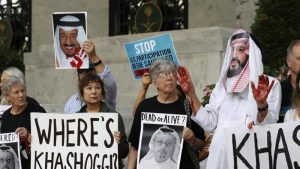
On Monday, October 8, Al Arabiya called out Al Jazeera and other media (such as CNN, BBC) that reported that the missing journalist was detained, tortured and dismembered inside the consulate.
In the story, titled: “Jamal Khashoggi mystery: Deleted tweets, unnamed ‘sources’ and fake funeral”, the Saudi medium called them “media outlets affiliated with the outlawed Muslim Brotherhood.”
——————————————
The big question is: When did these media become mouthpieces of the Muslim Brotherhood, the majority of whose members have been killed, with others incarcerated in Egypt since the removal of Mohammed Morsi in 2014 in a coup led by El-Sisi?
There is also no evidence that Khashoggi was a member of the group. He did not just become a dissident. He was a former insider turned critic of the Crown Prince Muhammad Bin Salman, before absconding from Saudi Arabia to the US, and joining the Washington Post.
——————————————
On October 11, Turkish press and other mainstream media, including Al Jazeera published the footage of the Saudi nationals suspected to have murdered Khashoggi in its consulate.
In the story, titled: “Turkey releases names of 15 Saudi suspects in Khashoggi murder”, a member of the “killer squad” was revealed to be working closely with Crown Prince Mohammed Bin Salman.
But, in a swift reaction, Al Arabiya debunked the news, claiming that the 15 men were Saudi tourists. The story was published same day, with the headline: WATCH: Who are the 15 Saudi tourists accused of killing Khashoggi?
In a desperate move to counter the so-called Muslim Brotherhood media outlets, KSA-sponsored Arab writers and columnists kept defending the Kingdom from what they called “media lies”, which according to Saudi Arabia’s Minister of State for Gulf Affairs, Thamer Al-Sabhan, are part of “systematic and organized campaigns that have been on-going for decades.”
In a story published on Saturday, October 13 with the headline: “Saudi minister: Media campaigns against Saudi Arabia are not a new occurrence”, Al-Sabhan said: “A number of Gulf leaders previously stated that the way in which Qatari and international media reported the Saudi journalist’s disappearance is blatant evidence of a global targeted campaign against Saudi Arabia.”

Mashari Althaydi, Al Arabiya’s English columnist, in his article on Wednesday, October 17, “Exploiting the Khashoggi card”, argued that “the case of Saudi journalist Jamal Khashoggi, whose fate is unknown to this day, has become more of a political and a media blackmail ‘card’ rather than a criminal case with a political scent.”
There were also countless columnists who wrote for Saudi Gazette in defence of the Kingdom. For instance, Dr Khaled M. Batarfi, in his article titled: “The lies and deception in the Khashoggi case!” accused Al Jazeera and western media of spreading lies.
In the introduction of the article published by Saudi Gazette, Dr Khaled, a known pro-Saudi columnist wrote: “When asked about the official Saudi response to the disappearance of journalist Jamal Khashoggi, I told Arab and foreign media that our story has always been clear, simple and firm: Jamal visited the consulate to do some paperwork and left. The end.”
Despite the on-going Saudi-led attack on Houthi rebels, which has led to the deaths of many innocent Yemeni children, the Saudi Gazette published an article titled: “Saudis do not kidnap and kill their enemies”, where the writer, Muhammad Al-Saeed claimed that the Kingdom has never kidnapped or assassinated opposition since its birth in 1902.
It was difficult for Saudi Arabia’s supporters and beneficiaries of their oil money across the world to believe that the Kingdom could be responsible for the disappearance and eventual murder of Jamal Khashoggi.
Khalid Al-Sulaiman of Okaz newspaper, Saudi Gazette’s sister publication raised a question in his article titled: “Why do they want to destroy Saudi Arabia?”, as published in the Saudi Gazette of October 17, where he revealed that there is a plot by Qatar and the Muslim Brotherhood to destroy Saudi Arabia, “the only country that represents Islam, applies Islamic Shariah laws, is the caretaker of the two Holy Mosques and is the country that mobilizes all of its capabilities to serve the guests of the two Holy Mosques.”
Saudi Arabia’s supporters, especially from among the Wahhabi-Salafiyyah sect, were not left out as they also rallied support for the Kingdom, insisting that the Kingdom is facing media backlash from the “Muslim Brotherhood media” because of its adamant position on maintaining the puritanical Islam.
Jumat AbdulGhaniyy, a Lagos, Nigeria-based Muslim Brotherhood critic argued that attacking the rulers publicly (like journalist Jamal criticised the Saudi leadership) is nothing but inciting the masses against the leaders. This, they claimed, is not allowed in Islam.
But Khalid A. Beydoun, an Associate Professor of Law at the University of Detroit Mercy School of Law and Senior Affiliated Faculty at the University of California-Berkeley, strongly disagreed.
In his article published in Al Jazeera, titled: “The Saudi regime does not represent Islam”, Professor Beydoun, one of the leading scholars of Islamophobia said, though home to Medina and Mecca, the two holiest sites in Islam, Saudi does not represent Islam, before and especially today.
“Saudi Arabia is just one nation, which enshrines an austere and primitive interpretation of Sunni Islam, Wahhabism. This tradition is only practised within the country of approximately 32 million people and other nations where the Saudi regime has spread its influence by way of direct economic and political influence, or indirectly, through the spread of terror networks.
“In fact, Indonesia, Pakistan and India are home to far bigger Muslim populations, and Nigeria has two-and-a-half times the number of Muslim citizens as Saudi Arabia. Beyond its spiritual and demographic shortcomings, Muslims globally are beginning to see Saudi Arabia as a blight to how Islam and Muslims are viewed, a sentiment that is especially strong in the US”, he stated, in part.
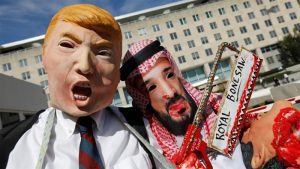
——————————————
…After 17 days of denial, what happened next?
1. On Friday, October 19, Saudi Arabia finally admitted that Khashoggi was murdered during a “fist fight” in its consulate in Istanbul, according to Al Arabiya‘s story, with the headline: “Saudi Arabia: Investigation confirms death of Jamal Khashoggi”.
However, the Kingdom has not provided evidence to support the “fist fight” version of the events. Who are “the people he met there”? No answer yet from the Kingdom. What is however glaring is that Khashoggi did not leave the consulate, contrary to Saudi Arabia’s earlier claim as written above.
2. The Kingdom has also sacked a Senior Adviser to the Saudi Royal Court, Saoud al-Qahtani and its deputy intelligence chief, Ahmed al-Assiri, who had both launched attacks against the Kingdom’s perceived enemies over the Khashoggi saga. Three others were also said to have been dismissed. The question is, for what? There is need for the Kingdom to explain in clear terms the role of these officials.
3. Also, 18 people, all Saudi nationals, were reported to have been detained “in connection to Khashoggi’s death” as investigations continue according to Al Arabiya.
However, Al Jazeera wrote: “Saudi Arabia has arrested 18 citizens ‘for killing journalist Jamal Khashoggi in a fist fight’ in its Istanbul consulate”.
A quick check on the Al Arabiya website on Sunday, October 21 showed that the denial story earlier published on October 11 by the medium has been updated with additional information that:
“Editor’s note: Though some of the 15 men were wrongly accused, it has emerged that the rest of those in the leaked footage were involved in the killing of Jamal Khashoggi.”
Al Arabiya did not however indicate who among the 15 men were innocent and who among them carried out the murder.
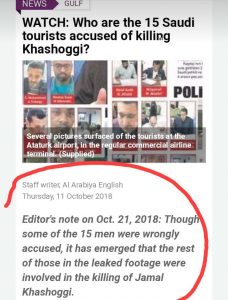
4. There is need for clear evidence that the journalist was killed in a fight and not beheaded and dismembered as earlier revealed in the audio recording reported by Al Jazeera and other western media.
Besides, many Muslim observers of the events have also requested for the corpse of the late journalist, for him to be buried according to Islamic rites, since he died as a Muslim.
——————————————
The question is: will Saudi release his corpse for the world to see?
——————————————
5. Now that the Kingdom has confessed to the killing of Khashoggi in its consulate, will the US President Donald Trump sanction his closest ally in the Middle East?
Well, Al Jazeera of Saturday, October 20, has the answer to the question in its story titled: “If Trump will not respond to Khashoggi killing, Congress might”, saying:
“Many US legislators are not accepting Saudi Arabia’s explanation of journalist Jamal Khashoggi’s death and are increasingly talking about sanctions – with or without the president’s support.”
My understanding of the Khashoggi saga
1. Khashoggi is definitely not the first journalist to be brought down in an inhuman manner by the authorities, and he will not be the last.
There have been rising cases of harassment and intimidation of journalists in different parts of the world, and efforts of international journalism bodies to fight for their members have been frustrated by the governments of those countries.
On a regular basis in Palestine, Israel has committed some of the most heinous crimes against journalists who covered the Israeli soldiers’ aggressions against peaceful Palestinian protesters.
Benjamin Netanyahu has not been brought to book and the mainstream media are not speaking out for their members.
Ditto for Egypt, where President AbdulFattah El-Sisi, who led a coup against former President Mohammed Morsi in 2014, has clamped down on the media. A lot of journalists are languishing in Firoun’s country, with no hope of survival.
Yet, they did not get enough support from their colleagues in the international media, although news about Palestinian struggles featured more in Al Jazeera than Al Arabiya.
If the Khashoggi saga can make a lead story in many western media for two weeks with in-depth analyses and live coverages, they can do the same or even better for their other colleagues who are victimised in other parts of the world.
Yet, journalists need to be responsible and not allow themselves to be used as propaganda tools in the hands of ruthless leaders.
2. If the Kingdom authorities did not cover up the murder of Khashoggi in its consulate from inception, it would not have been blown out of proportion by the “so-called Muslim Brotherhood media outlets” as alleged by the Kingdom’s apologists.
Perhaps, it would have been swept under the carpet if the unfortunate incident happened in Saudi’s friendly/ally nations. But is Turkey Saudi’s foe for calling on the Kingdom to tell the world what happened to Khashoggi? Like a respected Nigerian writer, Abu Mazeedatul Khayr wrote:
“… Tayeb Erdogan is a true vicegerent. He is no enemy of any Muslim…The real enemy is Trump, who claims that this irrational explanation is credible.”
3. Evidently, Al Jazeera showed resilience and determination to unravel the mystery surrounding Khashoggi’s disappearance from inception – a move which was not pleasant to the Kingdom.
There is no gainsaying that the Qatar-owned media outlet has been critical of the Saudi monarchy, and the criticisms became pronounced in 2017 when four Arab States, led by Saudi Arabia, severed diplomatic relations with Qatar, accusing Doha of supporting the Palestinian resistance movement, Hamas and Egypt’s Muslim Brotherhood, which they had already blacklisted as terrorist organisations.
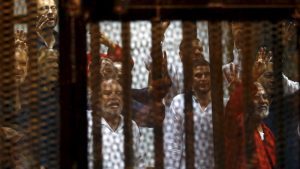
Saudi Arabia did not only ban Al Jazeera, the Kingdom’s propaganda machines (particularly Al Arabiya and Saudi Gazette) verbally attacked the Qatar-based network, calling it a terrorist outlet for always giving a voice to the voiceless people of Palestine.
Despite the attempt to blacklist the medium, Al Jazeera Arabic remains the most watched news channel in the Arab world and the English version, which is being watched in no fewer than 130 countries, is giving the world’s Muslims what other mainstream media cannot dish out; quality, verified and unbiased reportage of news and events from the alternative viewpoint.
These and more were what I wrote about in my article: “Al Jazeera vs Al Arabiya and Others”, during the 2017 blockade of Qatar by three other Arab nations, led by Saudi Arabia.
- Rasheed Abubakar is the publisher of Muslim News. Email; reawshield123@gmail.com / Twitter: @rawshieldpr

